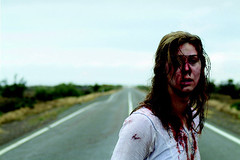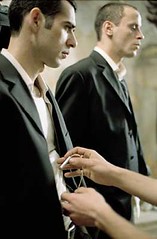Wolf Creek
Starring: Cassandra Magrath, Kestie Morassi, Nathan Phillips
Director: Greg McLean
 There are very few good horror flicks these days.
There are very few good horror flicks these days.
Even the big budget remakes like Dark Water and The Grudge invariably resort to cheap scare tactics like things suddenly popping up round the corner and the volume cranked up to ear-splitting levels.
And then you don’t want to watch it again cos you know all the gags.
Know this then: you will most likely only want to watch Wolf Creek once.
But not cos it was cheap.
Apparently based on true events (I know, but stay with me) the plot revolves around three backpackers who go on a road trip into the Aussie outback to visit Wolf Creek, a large meteor crater. Surprise, surprise, the hapless trio get stranded.
Thus begins a series of ass-fuckings like you wouldn’t believe. Like you wouldn’t wish on a group of loud-mouthed, obnoxious teens any more than you’d want to have been one of those poor sods had the Blair Witch Project actually been real.
No vagrants left for dead returning to exact revenge. No creatures hiding at the bottom of the lake who’ve been deprived of its diet of human food far too long. Just people. People who want to do bad things to you because they can.
Wolf Creek isn’t just violent. It’s vicious.
Director Greg McLean does wonders with his no-name cast, torturing them – and us – not with fear of the unknown, but the naked terror of certainty. This is a knife, it is sharp and cruel, and it is going to be in you.
He drags out every sadistic act and simple scenes become infinite moments of torture so by the time it happens, you’re pleading for mercy along with the characters.
But most of all, McLean is also unsympathetic. There are no mistakes, there is no stopping the onslaught that befalls the backpackers. Any relief is temporary, and any hope introduced is a cruel joke.
For this is the face of true evil:
When you meet a thing that doesn’t need to show you mercy, why would it stop?
And this gradually becomes the show’s downfall. The violence is so unforgiving, so unrelenting that you flinch too often, making the show physically draining. It’s hard-hitting stuff and you’re beaten into submission.
Eyes open or shut, you’re not likely to watch this again.
But you won’t forget that you did.
 Post 9/11, almost every take on terrorism has fallen into two stereotypes: the extremists or the sympathisers. This is the first movie I’ve seen told from the viewpoint of the terrorists themselves.
Post 9/11, almost every take on terrorism has fallen into two stereotypes: the extremists or the sympathisers. This is the first movie I’ve seen told from the viewpoint of the terrorists themselves.




